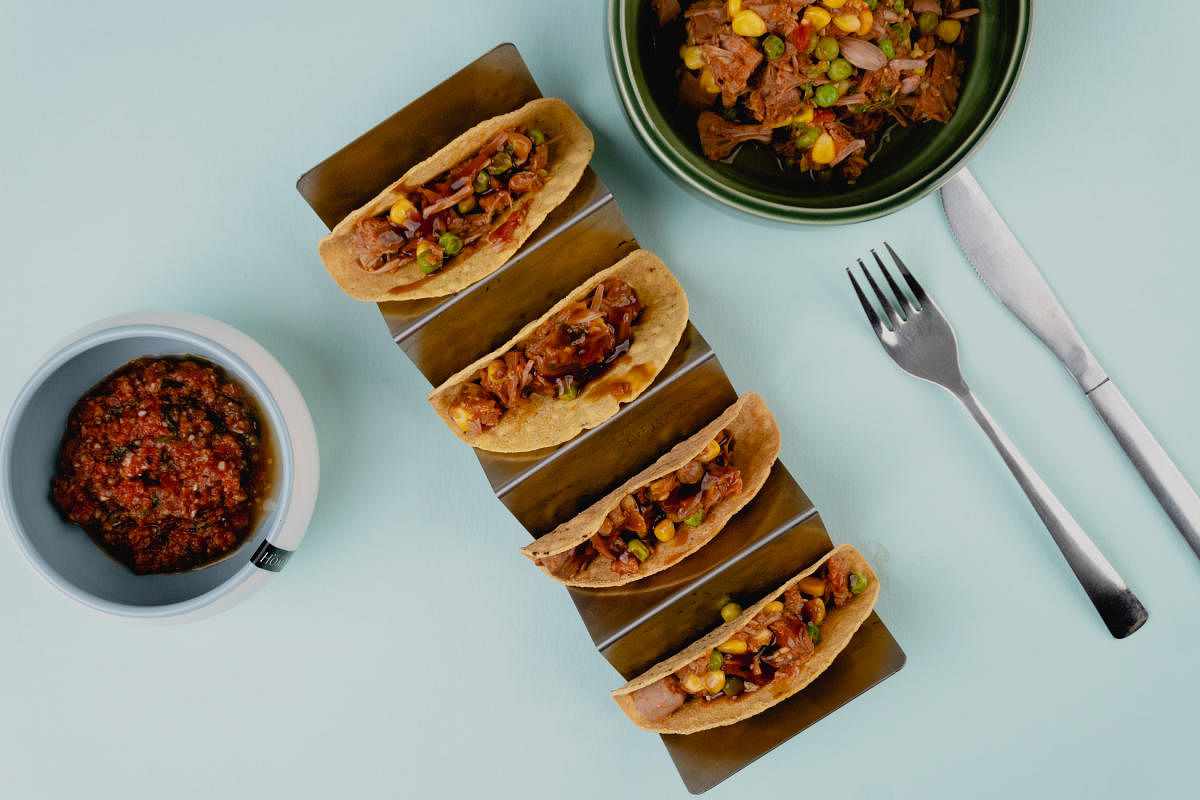
While plant-based proteins may not be new to Indian cuisine, they have been slightly unsuccessful not being able to capture people’s hearts and stomach. However, with the pandemic, there has been a renewed interested in meat alternatives. Ongal Lepcha, owner, Veggie Way, says that there has been a 30 per cent increase in their customer base since the pandemic.
“The pandemic has pushed many to adopt healthier lifestyles, and hence, there is a larger shift to veganism and vegetarianism. Mock meats provide the same texture and look like your normal meat,” says Sairaj Dhond, founder of Wakao Foods. As a company that started during the pandemic, he can’t speak to a shift in interest in numbers, however, he says that the R&D phase showed that there was an increased openness among consumers to experiment.
Vegandukan, an online platform which caters to plant-based products, has witnessed a five-fold increase in their client base. About 25 per cent of the consumers are from Bengaluru.
Tempeh, made of fermented soya; Seitan, made from wheat gluten and soya chunks are popular meat
substitutes.
“Since consuming gluten on a regular basis is not good for the body, we opt to make our products using soya. We also use tapioca, whey protein and soya protein. Yeast and identical, natural and man-made flavours are used as well,” says Ongal.
Minimally processed options
With the current focus on minimally-processed options, raw jackfruit is gaining popularity.
Its neutral flavour and stringy consistency create a lot of opportunities to create versions of dishes that feature shredded chicken or pulled pork.
“Apart from the texture of jackfruit, its nutritional content makes it a
better choice for those relying on a
plant-based diet,” says Sairaj, whose company works solely with jackfruit “meat”.
Target audience
Vegans who are always on the lookout for new options, those who have recently shifted from a non-vegetarian diet as well as those on the border looking for alternatives that can help them make the shift, form the target audience. “It is also seasonal. Catholics during Lent season or Hindus who follow a vegetarian diet one day of the week are also interested in these alternatives,” says Sairaj.
Vegetarian homemakers who have travelled and hence have tried such products make for most of Veggie Way’s consumers.
On Vegandukan, almost 50 per cent of their customers are non-vegans trying to cut down on their dairy and meat consumption.
Environmental aspect
As many who turn vegan are motivated by the environmental and ethical implications, mock meat producers work towards keeping that principle alive. “The animal agriculture industry as a whole top the greenhouse gas emission. How can the earth handle over 70 billion animals for just 7 billion humans?” says Sagar N Mehta, founder, Vegandukan.
Mock meats have the ability to meet the needs of your taste buds while causing much lesser damage to the environment.
Conscious consumerism is still at a nascent stage, says Sagar. “It will revolutionise the world in the next ten years. But, as with anything new, there are challenges with educating the market, customer adaptation and support from regulatory bodies,” he says. The only way forward, he adds, is to work on educating the market and keep learning ourselves. Maintaining quality is a struggle, says Ongal. “Import laws are stringent and the local suppliers are inconsistent with the quality,” he says. This also could account for the higher cost of these products. As the demand increases, prices will fall as production methods will become easier, he adds.
Not a restaurant favourite
Chef Vikas Seth says that more than mock meats, he has noticed a shift in demand for vegetarian protein. “It is not a big shift. There has been a 10 per cent increase,” he says. Textured soya, tofu, edamame and chia are the popular choices.
“Mockmeat have been around for a long time, as back as 2008, but there has never been a huge market for it,” he says. For those who eat meat, the alternative doesn’t cut it, and for those who have always been vegetarian, the substitute doesn’t interest them.
At his restaurant, they serve one dish, ‘Black Pepper Textured Soya Bao’ that has been very popular. However, he doesn’t see plant-based meats featuring menus heavily any time soon.
Those who step out to eat at restaurants want to eat food that they don’t eat otherwise but makes them feel good.
With the frequency of going out reduced, thanks to the pandemic, this holds true even more so, today. “It has great potential to grow as a retail product, but as a restaurant favourite, I doubt, but you never know,” he says.